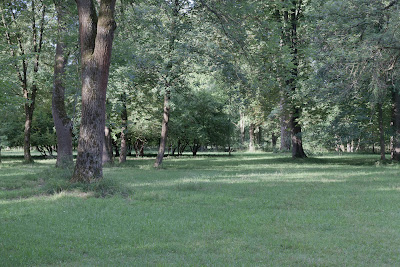Whilst it may be easy to find soft muted colours in the British landscape, this is not necessarily the case in other parts of the world. In southern Germany in summer time we essentially have two types of weather, hot sunny days with temperatures in the 30's punctuated by thunder storms with torrential rain. Together these contribute to strong vibrant colours in the landscape and a noted absence of soft colours unless of course we work them a little.
Somewhat naively early yesterday I headed north up the river Isar on my bicycle, hoping to catch some early morning light. It was after dawn, but I was still optimistic, fool, as soon as the sun clipped the trees shadows formed and a gloriously Blue sky covered the scene. However keeping the camera low avoided the "worst" of the sky and I captured the following photographs looking South along the river. The first photograph is at the meter suggested exposure, the two after successively overexposed by half a stop.
As the exposure increases the colours progressively soften as they lighten. None of these photographs have been adjusted post capture, other than conversion from RAW to JPG. The next photo is the 4th in the sequence, this time with no exposure bias and slightly different framing. This time I have "developed" the RAW negative to where I am happy with the outcome, again richer colours suit my taste. My point is that the colour quality of images has as much to do with digital processing as it does with the actual colour range at time of capture. In fact I am happy with both interpretations of the same scene.
By contrast looking North, I can see more of the Sun in the shot below (actually North East) and this again has washed out the image, although post processing could change this if I so choose.
In these cases the early morning light is still softer than I would expect at noon, however, the colours are already well defined and the greens of the trees are very dark at this time of year. I moved away from the river to an open grassy area. First capture has nothing to do with this project, I simply could not resist the fabulous sky. The low level of the sun is visible in the strong shadow on the East side (left) of the picture.
However, by changing the angle of the camera and processing towards a more neutral look a softer colour palette can be achieved:
As the sun was now starting to climb, any shots in the open were going to be dominated by sharply defined shadow and contrast. Under the trees, the sun was still struggling to penetrate, enabling the following two captures:
In both of these cases I have reduced contrast and saturation to soften the greens, once again the computer can deliver an element of the effect looked for in the brief. The limitation of the summer can be somewhat reduced by waiting for a rainy day. The following three photographs were taken this morning in my immediate neighbourhood.
In the first two images the colour palette is diminished, but is still pretty vibrant, even with toning down on the computer, again the rain/sun cycle pumps colour into the environment, Munich does not really do soft. In the final image I did the nearest thing to going to a quarry that we have here, I headed to the nearest buildings site. I quite like this last one, but I have always liked the gruggy and grim.
In a few months time this will change as we get the first few frosts of the Autumn, then all is change and a completely new colour palette is available. Here are a few shots I created last year, without any processing. I cannot admit to being a fan of these types of images, I like them, even admire the tonal range and colour, but they are a little cliched:
Soft colours are fine in some circumstances, I even like the slightly desaturated look of colour art photography from the 1970's, however, outside of "pretty" photographs of autumnal scenes or pastel coloured spring flowers cannot yet see where it fits into my personal practice. Perhaps this is something to dwell on and to experiment with once again as cold takes its grip and the ground starts to steam once more.
















No comments:
Post a Comment